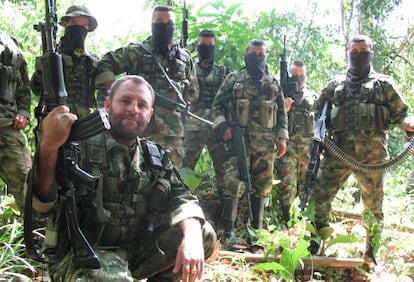Colombia seeks to uncover the mystery of drug trafficker “Megateo”
Around 350 officers are hunting the insurgent leader, who some think may already be dead

Víctor Ramón Navarro, alias Megateo, is one of the most important guerrilla leaders and drug traffickers in Colombia and, since Sunday, also one of its biggest mysteries.
That was when Colombian authorities began an operation to track him down. Preliminary information indicated that Navarro may have died during an ensuing confrontation with the police and army, but later reports said he had only been wounded and had managed to escape.
Now, the only certain thing is that 350 army and law enforcement officers have been deployed across the country to find the 39-year-old Popular Liberation Army (EPL) guerrilla leader, dead or alive.
Megateo is also wanted by the United States, which has offered a $5 million reward
Navarro has been wanted for more than a decade for attacks he ordered against military units with his reduced EPL guerrilla force, which operates out of Colombia’s northern Norte de Santander department.
He is also wanted by the United States, where government officials have offered a $5 million reward for information leading to his capture.
Now, Colombian Defense Minister Luis Carlos Villegas, who assumed his post at the end of June, has made it his personal mission to track down Navarro.
The EPL was disbanded in 1991, but over the last few years Navarro has led a group of die-hard members who have refused to give up the armed struggle.
Following the deaths of 27 members of the armed forces in two air accidents on July 31 and August 4, the government of President Juan Manuel Santos would regain a large dose of credibility if it were successful in finding Megateo.
Even though the armed forces are held in high esteem by Colombians, the ongoing peace talks between the government and Revolutionary Armed Forces of Colombia (FARC) guerrillas taking place in Havana have been inching along at a snail’s pace.
Megateo ordered his men to blow up a military truck carrying officers and secret DAS police agents in 2006
Nevertheless, the talks have also kept the government from dealing major blows to insurgent groups and drug traffickers as it had in the past.
Since the beginning of the year, more than 1,200 army and police officers have been hunting, to no avail, for another of the country’s most wanted fugitives: Dairo Antonio Usuga, alias Otoniel, the leader of the Urabeños drug cartel.
But Megateo is one of the Colombian military’s biggest headaches. During an operation aimed at capturing him in 2006, Megateo ordered his men to blow up a military truck carrying officers and secret DAS police agents. The attack, which resulted in the deaths of 17 officers, is one of the worst Colombia has experienced in the last decade.
In an interview with news weekly Semana in 2013, Megateo admitted that he charged “a tax on drug traffickers” in the Catatumbo region in Norte de Santander.
“That’s how we finance our insurgency,” he explained. “We charged 400,000 pesos (about $130) per kilo of coca but we don’t harvest the fields or own the installations that process cocaine.”
Authorities believe that the EPL now has only about 100 guerrillas – a number much reduced from the over 4,000 members it had before it disbanded.
Megateo’s power and prestige extends across the border to Venezuela where, according to defense sources, officials have helped him sneak in and transport his drug money. His network of contacts is vast, authorities have claimed.
A robust man, Megateo’s power is often compared to that of Joaquin El Chapo Guzmán – the head of the Sinaloa cartel who made a daring escape from prison last month. His fingers are covered with gold, diamond and emerald rings.
When asked by Semana what he thought about being the most-wanted fugitive in Colombia, Megateo responded: “It’s normal – they are in love with me and they also realize they have an enemy.”
English version by Martin Delfín.
Tu suscripción se está usando en otro dispositivo
¿Quieres añadir otro usuario a tu suscripción?
Si continúas leyendo en este dispositivo, no se podrá leer en el otro.
FlechaTu suscripción se está usando en otro dispositivo y solo puedes acceder a EL PAÍS desde un dispositivo a la vez.
Si quieres compartir tu cuenta, cambia tu suscripción a la modalidad Premium, así podrás añadir otro usuario. Cada uno accederá con su propia cuenta de email, lo que os permitirá personalizar vuestra experiencia en EL PAÍS.
¿Tienes una suscripción de empresa? Accede aquí para contratar más cuentas.
En el caso de no saber quién está usando tu cuenta, te recomendamos cambiar tu contraseña aquí.
Si decides continuar compartiendo tu cuenta, este mensaje se mostrará en tu dispositivo y en el de la otra persona que está usando tu cuenta de forma indefinida, afectando a tu experiencia de lectura. Puedes consultar aquí los términos y condiciones de la suscripción digital.









































